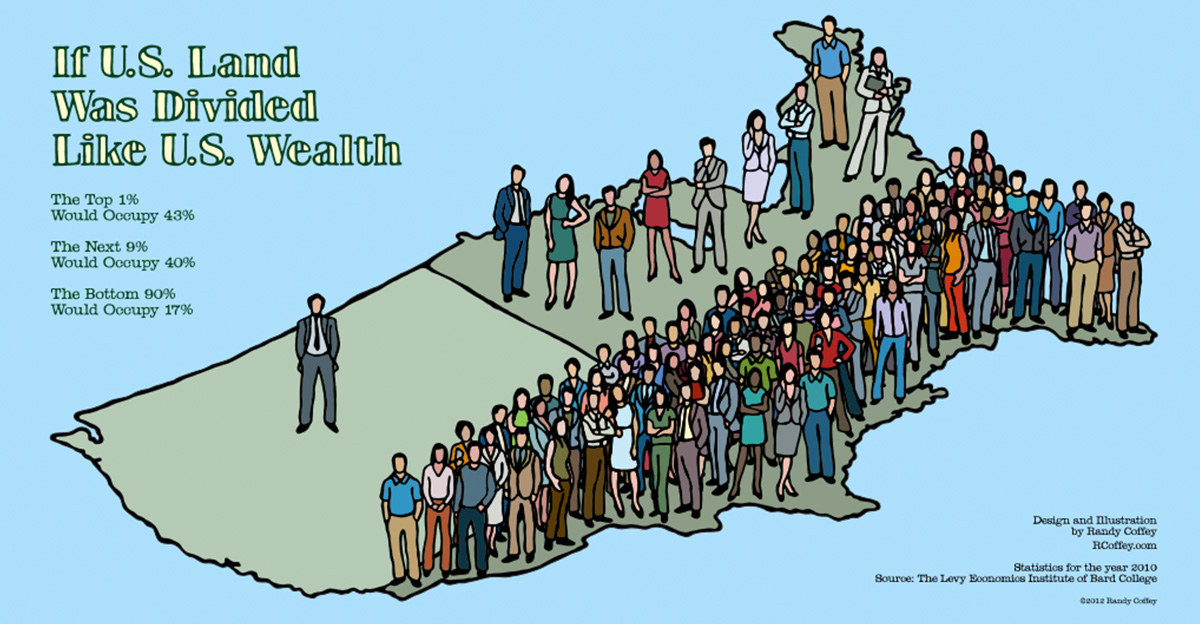Societal Inequality

I recently came across an article discussing a book authored by two epidemiologists entitled,"The Spirit Level: Why More Equal Societies Almost Always Do Better" ...
The book title caught my attention because it addresses an issue that seems to me to be at the heart of a lot of the conflict now occurring in our political system. It is well documented that over the past 20 to 30 years, income inequality in the U.S. has increased substantially and that, while the incomes of the lower 95% of wage earners have stagnated, the upper 5% have seen dramatic increases in earnings. This circumstance has implications for all kinds of issues this country is now facing: 1) the anger over the Wall Street bailout and executive salaries/bonuses, 2) the seemingly unequal influence that highly paid lobbyists and special interest money has over our politics and politicians, 3) the inability of millions of Americans to purchase adequate health insurance, 4) the increasing number of people earning below the poverty level and the consequent costs to society, 5) the highest rate of incarceration of any developed country in the world, and many other issues.
The study that "The Spirit Level" is based on directly addresses the inequality issue by comparing various indexes of societal problems to levels of inequality measured for developed ("rich") countries throughout the world. Charts used for these comparisons paint a startling picture supporting the authors' conclusion that higher levels of societal problems are strongly positively correlated to higher levels of inequality. Particularly noteworthy are the consistently troubling locations of the U.S. data points on the charts. The article linked above includes some explanations for a subset of these correlations, but just a quick run-through of the charts provides a clear picture of the book's thesis. The article provides other links to reviews and comments on the study and the book. As would be expected, there are criticisms about how the study results should be interpreted, but there doesn't seem to be any serious disagreement with how the data were collected and analyzed (i.e., the charts).
You can draw your own conclusions (I'm going to attempt to read the book). Embedded below is a Ted Talk given by Richard Wilkinson, one the authors (along with Kate Pickett) of The Spirit Level. The Equality Trust is an organization and a web site set up by the study authors and provides more information, analysis, and news regarding the issue of societal inequality.
The Places We Live is an amazing photojournalism exhibition that gets right to the heart of what economic inequality really means throughout the world. The first US venue for the exhibit was at the National Building Museum in Washington DC in September-November of 2009. Here is a description posted on the museum's website:
"In late summer 2005, Magnum photographer Jonas Bendiksen moved into a small room in the middle of Kibera, Nairobi, to try to understand how daily life is lived in one of Africa's largest slums. He was immediately struck by the residents' awesome capacity to create normalcy and dignity out of extremely challenging living conditions.
His stay in Nairobi sparked a three-year project documenting households and families in Caracas, Mumbai, and Jakarta. Bendiksen attempted to challenge some of his own assumptions about urban poverty. He discovered that it was impossible to generalize the lives and experiences of one-sixth of the world's population. He discovered that - beyond the common perceptions of poverty, misery, destitution, insecurity, and danger - there were more stories that needed to be expressed. In The Places We Live, Bendiksen captures the enterprise and hard-work, hope and humor, and love and compassion that occur even in the face of some of the world's most difficult environments."
The exhibition can be viewed at The Places We Live website. Just a heads up, there is an audio component to the site.